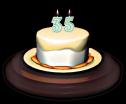
I have noticed since I have been using either a walker or a cane to ambulate that people have been treating me differently. Some have looked on me with genuine concern, some have looked at me as if I have a contagious disease that might transmit itself onto them, and some have looked at me with that morbid curiosity when one sees a particularly gruesome sight.
Being a gimp who is hobbling around and limping a lot has given me a unique perspective into how people treat others who have infirmities. Most people will hold doors open for you and will look with concern whether you are safe. Some, however, must be terribly frightened of anyone who is "different" and almost run the other way.
My biggest pet peeve during this invalid period of my life has been those individuals who fail to observe those no parking signs under the canopy at the doctor's office. You know the ones that say, "No Parking," or "Do not leave your car unattended, patient loading zone." I have found that there are always those who think these signs do not apply to them because they are only running into the pharmacy to drop off or pick up a prescription and it will only take a moment, or they have some urgent business in the doctor's office and have parked there only 10 or 15 minutes. The majority of these, I notice, also do not exhibit handicapped signs for their vehicles and are not picking up or dropping off a patient.
In the meantime, those who are handicapped and unable to ambulate very far or who need help getting up or down a curb, must walk around these vehicles or walk twice the distance just to get into the building. Or, how about those dolts who sit on the benches near the entrance to the building smoking their cigarettes and watch as the incapacitated struggle to open the door to the building while trying to balance on a cane and never once offer to help.
Having worked in the healthcare sector for many years, I am attuned to the needs of the health-impaired. Over the course of those years I have held many a door and assisted quite a few people to ensure their safety and to show a modicum of polite behavior in attempting to help them if needed. Being on the receiving end, however, has shown me a completely different aspect of human behavior.
I have come to the conclusion that most people are kind and helpful. Most people practice what they believe in and are preached to in church on Sundays. Most people are nice. To these people, know that you are appreciated for your kindness and your helpfulness. You are good people.
Some people, however, are selfish, blind to the needs of others, heartless, afraid, nasty, unthinking, self-centered, and callous. Somehow they think it couldn't happen to them. If they do become infirm, will they expect and receive assistance? Or, will they think that they are the only ones that have ever suffered in this world?
Our local paper prints a lot of those "thank yous" from people who have been injured, sick, had surgery, or suffered the loss of a loved one. These people wish to thank their friends, family, and neighbors who have shown them kindness during their moment of need.
I wish to acknowledge those strangers who have shown charitable kindness to me during this period in my life. These are the people who don't expect a formal thank you or a reward. They are just caring individuals who practice what they preach. Do unto others. You know who you are.
 Sunday, June 18, 2006
Sunday, June 18, 2006











